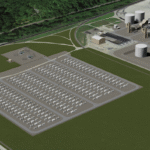Optimizing Your Energy Storage Strategy
As the world shifts towards a more sustainable future, energy storage has become a critical component of the global energy mix. With the increasing adoption of renewable energy sources, energy storage solutions can help mitigate the intermittency of solar and wind power, ensuring a reliable and efficient energy supply. In this article, we’ll explore the efficiency game and provide tips and tricks for energy storage success.
Understanding the Challenges of Energy Storage
Energy storage solutions face several challenges, including high upfront costs, limited scalability, and integration with existing infrastructure. To overcome these challenges, it’s essential to have a comprehensive understanding of the energy storage landscape.
Efficiency Optimization Strategies
Efficiency optimization is crucial for energy storage systems to function effectively. Here are some strategies to help you optimize your energy storage system’s performance:
Sizing Your Energy Storage System
Proper sizing of your energy storage system is critical to ensure optimal performance. Consider factors such as your energy demand, backup power needs, and grid connection requirements to determine the right size for your system.
Choosing the Right Battery Type
There are various battery types available, each with its unique characteristics, advantages, and disadvantages. Consider the following factors when selecting a battery type:
- Energy density
- Power density
- Cycle life
- Self-discharge rate
System Design and Integration
A well-designed energy storage system requires careful consideration of the following factors:
- System architecture
- Component selection
- Monitoring and control systems
- Integration with existing infrastructure
Best Practices for Energy Storage Maintenance
Regular maintenance is essential to ensure the optimal performance and longevity of your energy storage system. Here are some best practices to follow:
Regular System Checks
Regular system checks can help identify potential issues before they become major problems. Schedule regular inspections and maintenance to ensure your system is running efficiently and effectively.
Monitor and Analyze Performance
Monitoring and analyzing your system’s performance can help you identify areas for improvement and optimize its efficiency. Utilize data analytics tools to track your system’s performance and make data-driven decisions.
Conclusion
In conclusion, energy storage is a critical component of the global energy mix, and optimizing its efficiency is crucial for a sustainable future. By understanding the challenges, implementing best practices, and choosing the right battery type, you can ensure a successful energy storage system. Remember to regularly maintain your system, monitor its performance, and analyze data to make data-driven decisions. With these tips and tricks, you can play the efficiency game and achieve energy storage success.
FAQs
Q: What are the most common energy storage solutions?
A: The most common energy storage solutions include lithium-ion batteries, lead-acid batteries, and flow batteries.
Q: How do I determine the right size for my energy storage system?
A: To determine the right size for your energy storage system, consider your energy demand, backup power needs, and grid connection requirements.
Q: What are the benefits of energy storage?
A: The benefits of energy storage include reduced energy costs, increased energy independence, and reduced greenhouse gas emissions.
Q: How do I maintain my energy storage system?
A: Regular system checks, monitoring, and analyzing performance are essential for maintaining your energy storage system. Regular maintenance can help identify potential issues and optimize system performance.
Q: What is the most efficient energy storage technology?
A: The most efficient energy storage technology is the lithium-ion battery, with an efficiency rate of 95% compared to other battery types.
Q: Can energy storage systems be used for multiple applications?
A: Yes, energy storage systems can be used for multiple applications, including grid-scale energy storage, residential energy storage, and commercial energy storage.
Q: What is the average lifespan of an energy storage system?
A: The average lifespan of an energy storage system is 10-15 years, depending on the type and quality of the system.
Q: Can energy storage systems be integrated with renewable energy sources?
A: Yes, energy storage systems can be integrated with renewable energy sources, such as solar and wind power, to ensure a reliable and efficient energy supply.


.png?w=150&resize=150,150&ssl=1)
.png?w=150&resize=150,150&ssl=1)



.png?w=150&resize=150,150&ssl=1)